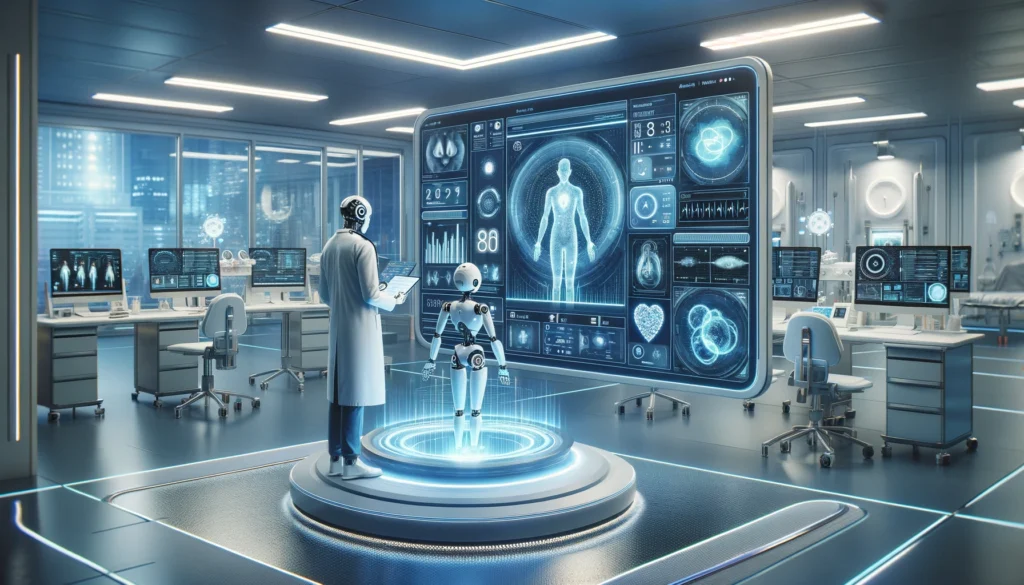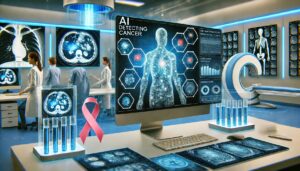Introduction
Artificial Intelligence (AI) has become an indispensable asset in healthcare, driving advancements across diagnostics, treatment personalization, patient monitoring, and operational efficiencies. This technology’s ability to process and analyze vast datasets with remarkable speed is transforming how healthcare providers deliver care, ultimately improving patient outcomes and streamlining costs.
The Impact of AI on Key Areas of Healthcare
- Enhanced Diagnostics and Imaging
AI has revolutionized medical imaging, enhancing the speed and accuracy of diagnostics. Algorithms can analyze CT scans, MRIs, and X-rays to detect conditions, including fractures, tumors, and even heart disease, more reliably than human radiologists in some cases. For instance, AI algorithms can assist cardiologists in detecting heart arrhythmias from ECG data, which helps identify life-threatening conditions early on and improve patient outcomes. - Predictive Analytics for Preventive Care
By leveraging predictive analytics, AI can anticipate health complications before they arise. Hospitals use machine learning models to identify patients at high risk for issues like sepsis or heart failure readmissions. With predictive scoring systems, hospitals can proactively address patients’ needs, potentially reducing readmissions and preventing the progression of severe conditions. - Precision Medicine and Personalized Treatment
AI is instrumental in tailoring treatments to individual genetic profiles, particularly in fields like oncology and immunology. This allows healthcare providers to predict how a patient might respond to specific therapies, optimizing treatment plans and minimizing adverse reactions. For example, AI-driven tools help oncologists determine the most effective chemotherapy regimens based on a patient’s unique profile. - Drug Discovery and Development
Traditional drug development is often lengthy and costly. AI significantly reduces this timeline by analyzing complex biochemical data to identify potential drug compounds. AI applications also facilitate patient selection and trial matching, which speeds up the clinical trial process and accelerates the availability of life-saving treatments. - Remote Monitoring and Wearables
AI-powered wearables and remote patient monitoring devices collect continuous health data, alerting healthcare providers to any critical changes in a patient’s status. These tools are essential in managing chronic conditions and empowering patients to take proactive roles in their health management. - Improving Operational Efficiency
Beyond patient care, AI is enhancing healthcare’s operational side by optimizing scheduling, staffing, and supply chain management. Machine learning models analyze hospital workflows to streamline tasks, reducing administrative burdens on healthcare providers and allowing them to focus on patient care.
Future of AI in Healthcare
The future of AI in healthcare is rich with potential, including innovations like brain-computer interfaces for patients with mobility impairments and expanded use of virtual health assistants. However, widespread AI integration comes with challenges, such as data privacy concerns, ethical issues, and the need for transparency in AI-driven decision-making.

Conclusion
AI is transforming healthcare at every level, from diagnostics and treatment personalization to operational efficiency. While hurdles remain, its potential to improve healthcare delivery, enhance patient outcomes, and reduce costs is undeniable. As AI continues to evolve, healthcare professionals and institutions that embrace these advancements are poised to offer superior patient care.
For more detailed insights, you can refer to resources on platforms like the World Economic Forum , Medwave Billing & Credentialing, The forefront of innovation | Flatirons which provide in-depth discussions and case studies on AI applications in healthcare.




